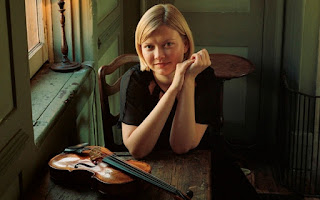Composer: Dmitri Shostakovich
- (01) Violin Concerto No. 1 in A minor, Op. 77
- (05) Violin Concerto No. 2 in C sharp minor, Op. 129
Alina Ibragimova, violin
State Academic Symphony Orchestra of Russia 'Evgeny Svetlanov'
Vladimir Jurowski, conductor
Date: 2020
Label: Hyperion
----------------------------------------------------------------------------
If there’s one factor above all that sets these performances apart it’s the osmosis between soloist and conductor. There’s a musical and intellectual friction going on here and it has to do with the balance between head and heart. If you listen to Maxim Vengerov and Mstislav Rostropovich in the First Concerto (Teldec, 2/95) – the more ‘public’ of the two – the heart rules, passion prevails, and the outcome is more overtly ‘romantic’ than anything you’ll hear from Ibragimova and Jurowski.
First off, Ibragimova’s playing has an unvarnished truth about it. It’s the kind of playing that looks you unblinkingly in the eye and tells it like it is. She’s not afraid to ‘invade your space’ or apply pressure to the sound until its rawness is almost unbearable. But equally she (and Jurowski and his marvellous orchestra) catches the emotional remoteness at the dark heart of the first movement and especially in the moments before the chill of celesta opens up another magic casement to the composer’s inner world and the soloist ascends to create a kind of halo of sound above the deep tolling of the tam-tam.
From soloist and conductor, the bone-dry Scherzo is the dance equivalent of a rictus grin – gritty, pugnacious and then some. Strings could snap under this kind of trenchancy. And then there’s that extraordinary Passacaglia which attempts to lend foundation and even a degree of nobility to perhaps the most emotive ‘aria’ Shostakovich ever penned. Ibragimova calls to mind Katerina’s suicidal oration in the closing scene of Lady Macbeth of Mtsensk – and any feelings that have been held in check are then vented in the cadenza. Deliberate and remorseless at first, the intensity goes off the scale as its delirium builds.
The Second Concerto is a much more personal (indeed individual) statement and one in which the words ‘in confidence’ are repeatedly called to mind. Its three cadenzas are essentially conversations with self and even the relationship with the orchestra is different, with the soloist seeming to ‘commune’ with it collectively and individually. Her dialogue with the bassoon – Shostakovich’s instrument of choice for solitude – has the feeling of being ‘overheard’ and that’s as much to Ibragimova and Jurowski’s credit as the composer’s.
Street songs – like the nagging little ditty used in The Execution of Stepan Razin – add a layer of irony and cynicism to the mix (as in you don’t always know what the composer is really saying), but there’s one moment in this piece that I covet and it comes at the end of the slow movement when the solo horn brings an air of hopefulness into the equation. It’s Shostakovich as Schubert and it’s indelible.
-- Edward Seckerson, Gramophone
MusicWeb International RECORDING OF THE MONTH
----------------------------------------------------------------------------
Dmitri Shostakovich (25 September 1906 – 9 August 1975) was a Russian composer, and a prominent figure of 20th-century music. Shostakovich achieved fame in the Soviet Union, but later had a complex and difficult relationship with the government. Shostakovich's music is characterized by sharp contrasts, elements of the grotesque, and ambivalent tonality; the composer was also heavily influenced by the neo-classical style pioneered by Igor Stravinsky, and by the post-Romanticism associated with Gustav Mahler. Shostakovich's works include 15 symphonies, 15 string quartets, and a substantial quantity of film music.
http://en.wikipedia.org/wiki/Dmitri_Shostakovich
http://en.wikipedia.org/wiki/Dmitri_Shostakovich
***
Alina Ibragimova (born 28 September 1985 in Polevskoy, Russian SSR) is a Russian-British violinist. She studied under Valentina Korolkova at the Gnessin State Musical College in Moscow, then under Natasha Boyarskaya at the Yehudi Menuhin School in London. Ibragimova was a member of the BBC Radio 3 New Generation Artists scheme 2005-2007. She has been the recipient of a number of awards including the Royal Philharmonic Society Young Artist Award 2010. She performs on a c.1775 Anselmo Bellosio provided by Georg von Opel, and has recorded several albums for Hyperion label.
https://en.wikipedia.org/wiki/Alina_Ibragimova
http://www.alinaibragimova.com/
https://en.wikipedia.org/wiki/Alina_Ibragimova
http://www.alinaibragimova.com/
----------------------------------------------------------------------------
FLAC, tracks
Links in comment
Enjoy!



This comment has been removed by the author.
ReplyDeleteThank you !
ReplyDeleteMany thanks!
ReplyDeleteCould you please reupload this?
ReplyDeleteChoose one link, copy and paste it to your browser's address bar, wait a few seconds (you may need to click 'Continue' first), then click 'Skip Ad' (or 'Get link').
ReplyDeleteIf you are asked to download or install anything, IGNORE, only download from file hosting site (mega.nz).
If MEGA shows 'Bandwidth Limit Exceeded' message, try to create a free account.
http://lyksoomu.com/BGNs
or
https://uii.io/eBZOR9
or
https://exe.io/CvjrLqFY